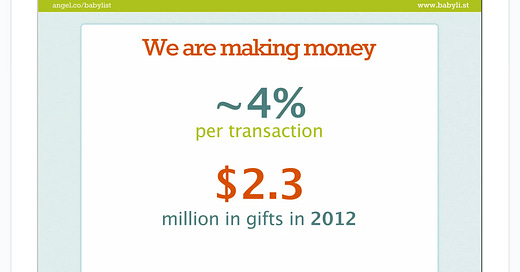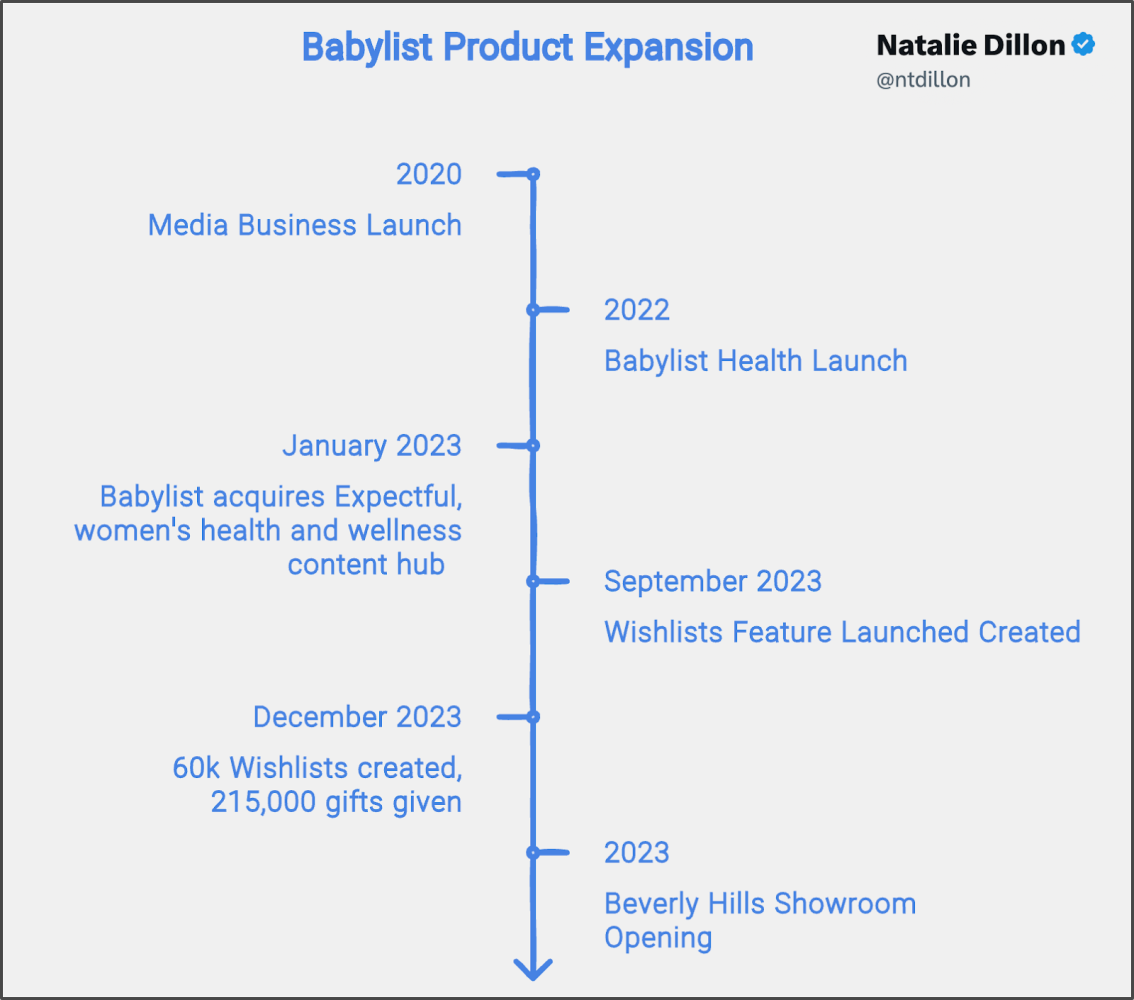Babylist: A Sleeping Giant in the Parenting Economy
Written by Natalie Dillon, re-publishing here
My Partner at Maveron, Natalie Dillon, wrote this post, I’m excited to re-post it here, enjoy!
As an investor, it’s rare to find a company that not only disrupts an entire industry but also does so discreetly, profitably, and with minimal venture capital investment. Babylist, founded in 2011, is one such gem - quietly growing into a behemoth in the parenting space. By my estimate, nearly 1 in 3 US parents today uses Babylist as their registry of choice.
Babylist was born out of a personal need of its founder, Natalie Gordon. Gordon, expecting her first child, found herself frustrated by the limited and restrictive options available in baby registries. What she wanted didn't seem like much: an online registry that could include products from various retailers and reflect the true needs of expectant parents like herself. As a former software engineer at Amazon, Gordon went to work and built an MVP that became Babylist, an online registry enabling expecting parents to seamlessly add items from any store or website.
Gordon launched Babylist in 2011, two weeks before her first son was born. The extraordinary feat of parallel incubating a company and baby would be the first of a string of unique accomplishments by Gordon. Today, Babylist processes over $1B in gross merchandise value (GMV), delivered revenue growth of 40% year over year in 2023 to surpass $400M in sales. In an interview, Gordon shared “almost every year in the last 10 years was profitable." Remarkably, while many other startups rushed to raise capital during this period, Babylist accomplished all this without a war chest of venture funding. After a small incubator financing in 2012, the company funded its own growth for the next six years and has only done two major financing rounds since, totaling $50M total raised.
Babylist revenue has grown accordingly the last 5 years:
Sources: Forbes, Forbes, ModernRetail, FastCompany
As you can see in their original seed deck below, the initial business model was purely affiliate-based. Babylist earned ~4% of the total sales every time a consumer made a purchase through a link on their platform.
From Babylist's original deck in 2012
Since founding, the Babylist platform has expanded and diversified to include several new product lines and revenue channels, enabling Babylist to deepen their relationship with their existing users beyond baby registries.
➡️ Media: Babylist has a fully integrated content studio and distribution platform, and they create all of the content they distribute in-house. Lee Anne Grant, Babylist’s chief growth officer, shared that "it’s one of our fastest-growing revenue streams”
➡️ Insurance / health: Babylist Health helps users navigate insurance coverage for breast pumps. The site verifies insurance coverage, providing a personalized list of covered breast pump options. Some 10% of new customers now use the service.
➡️ Wishlists: Babylist launched “Wishlists,” making it easy for parents to create and share wishlists for children’s birthdays and holidays.
Outside of product expansion and revenue diversification, I want to call out two major inflection points that became clear as I read and researched more about Babylist.
(1) Evolving from having product-market fit to finding distribution: in an interview, Gordon shares:
By 2015, it felt like we had this great product market fit with the registry, people would use it, they would like it, they would tell friends and family about it, but there was truly a pivotal time period when we started to figure out distribution. That marketing channel for us was Pinterest. Before that time period we had product market fit but didn't have this real distribution and capability to really grow this business. There was a lot of wishful thinking. It felt like oh I really hope that we get this PR opportunity rather than really have a strategic next step of we're going to put these marketing dollars into this channel and that's going to triple the size of the business this year”
COVID tailwinds accelerated network effects that then sustained themselves. In a separate interview, Gordon shared the uncertainty the team faced in early 2020. There was fear the pandemic would result in fewer in-person showers, which would in turn result in fewer registries. In actuality, the pandemic had the opposite effect. She shares:
What we actually saw, because of the shift towards online and because people really wanted to help more, they wanted to really help their friends and family, we saw huge tailwinds across every metric. Number of people using the registry, engagement on the registry, gifts given on the registry. 2020 really had this tailwind that has been maintained. Revenue grew more than 100% from 2020 to 2021.
Since the registry product is inherently viral, more registries attract more new friends and family to the site. In turn, these friends and family gift-givers themselves eventually become parents who create their registries - and on it goes. Gordon built a business where tailwinds (unplanned and planned) could dramatically and organically amplify the business.
Looking ahead, I’m eager to watch what Babylist does next. It’s a unique company that sits at the center of the family social graph and has tremendous amounts of data on the parenting economy. I’m also curious to see how it captures the generational transition from Millennial to Gen X parents. Gen Z are in their earliest innings of having children. The oldest of this cohort turn 27 this year, and the average woman is having their first child at 27.5. We know that Gen Z is already uprooting millennial wedding conventions and prefer different event platforms relative to their millennial and Gen X peers.
The Parenting Economy is a space Maveron has followed closely, from our investment in Zulily to more ones like Lovevery and Rebelstork. If you're building in this space or have thoughts/disagreements with what I've posted, drop a line! All takes welcome, hot takes encouraged.






Really loved this outline 👍
Wow this is so outstanding. Baby lists existed from time immemorial and back in those days most of the cultures followed some kind of algorithm. So Natalie you entered a ancient library and rearranged it to make meaning for the todays world, you closed the gap between Baby's list and created BabyList very good. All the best I assume your fan will use it for her new one!!